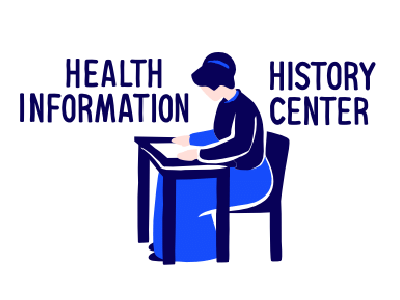As an intern for AHIMA Foundation, I was immersed in the history of medical record keeping and had the opportunity to get a behind-the-scenes look at the newly established Health Information History Center, a digital archive dedicated to preserving the history of medical records and the evolution of the health information profession in the United States.
As a Public Health student, I feel the educational curriculum is often focused only on the present. Yet, understanding medical records and the changes that took place to create today’s modern electronic medical record systems is a key step in improving public health knowledge and identifying the factors shaping current health outcomes.
 The Health Information History Center offers a new dimension of understanding in public health, as historical context is an important component to understanding what has shaped today’s modern medical record and its impact on the patient experience within our healthcare ecosystem.
The Health Information History Center offers a new dimension of understanding in public health, as historical context is an important component to understanding what has shaped today’s modern medical record and its impact on the patient experience within our healthcare ecosystem.
I found it interesting connecting the dots between the articles included in the digital archive — which currently dates back to the 1920s and is organized by decade. The old newspaper clippings – and the stories they told – brought to light how influential the historical developments in the field of medical records have been over the past hundred years.
Here’s What You Can Learn About in the Health Information History Center:
- Early Medical Record Librarians: Take a closer look at the women who brought medical record keeping to hospitals –. women who pioneered the field of medical record keeping and opened a new career opportunity to the following generations.
- New Degree Programs and Scholarships: A growing need for medical record keepers led to new degree programs and scholarships to incentivize individuals to pursue career opportunities.
- Early Medical Records: Many articles discuss the methods and purpose of early medical record keeping, including how this new development intersected with changes in health outcomes.
- Changes in Technology and Medical Care: The growth of technology impacted medicine through advancements in medical record keeping and sparked changes in available medical treatments and the patient’s role in their own healthcare decisions.
- Electronic Health Records: A pivotal moment in the history of medical record keeping was the adoption of electronic health records. The introduction of technology in hospitals completely changed how medical records are composed and stored. For example, as of 2019, per CDC data, over 89.9% of physicians use Electronic Medical Record systems.
- Patient Access to Medical Records and Confidentiality: Developments in medical record keeping sparked debate over whether electronic medical record-keeping was a method that retained the same privacy and security of a patient's confidential health information. The accessibility of electronic medical records is another issue discussed.
- Health Literacy: A common thread through all time periods of medical record keeping is health literacy. Throughout the decades, there have always been distinct inequities in consumers’ access to and understanding of their own medical information – which ultimately impacts health outcomes.
Through my involvement with this project, I now have a better understanding of motivations for changes in medical record keeping and the results of past changes in patient experiences – lessons I will carry with me in my future career in public health.
